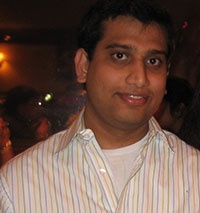 |
Page History
| Excerpt |
|---|
SYNOPSIS: In the era of big data, effective use of increasingly larger, complex, and diverse datasets has become a critical challenge for healthcare transformation. To meet the challenge, the scientific community must deliver innovative and scalable frameworks for interpreting the influx of information to keep pace with rapid scientific developments. The mission of a national lab is to enable scientific innovations and transformative technical breakthroughs for grand challenges by leveraging unique resources. ORNL is taking on this "Big Data to Knowledge" challenge for health innovations via its Health Data Sciences Institute (HDSI). In this presentation Dr. Tourassi will discuss informatics innovations coordinated by the institute to expand and accelerate biomedical knowledge discovery. Dr. Tourassi will illustrate the value of these innovations with two cancer-related examples from precision medicine and population health. The first example will demonstrate how linking of heterogeneous information across The Cancer Genome Atlas (TCGA) can provide novel insights into cancer-specific mutations at the individual level that can then directly inform molecular epidemiology of specific tumor states. The second example will demonstrate the use of cyber-informatics to accelerate discoveries in environmental cancer epidemiology. Underlying the two applications is a powerful semantic reasoning framework built at ORNL that enables seamless hypotheses generation for exploratory researchthis talk, Mr. Madduri will describe Globus Genomics, a system that was developed for rapid analysis of large quantities of next-generation sequencing (NGS) genomic data. This system is notable for its high degree of end-to-end automation, which encompasses every stage of the data analysis pipeline from initial data access (from remote sequencing center or database, by the Globus file transfer system) to on-demand resource acquisition by a specialized elastic provisioner (on Amazon EC2); specification, configuration, and reuse of multi-step processing pipelines (via the Galaxy workflow system); creation of custom Amazon Machine Images; and efficient scheduling of these pipelines over many processors (via the HTCondor scheduler). The system allows biomedical researchers to perform rapid analysis of large NGS datasets using just a web browser in a fully automated manner, without software installation or a need for any local computing infrastructure. |
BIO:
Ravi Madduri is a senior researcher at the Computation Institute and project manager in the Mathematics and Computer Science Division at Argonne National Laboratory. Mr. Madduri is also an innovation fellow at the Polsky Center of Entrepreneurship at for Entrepreneurship and Innovation at the University of Chicago. He led several successful large projects in NSF, NIH and DoE. His research interests are in building sustainable, scalable services for science, reproducible research, large scale data management and analysis. He is one of three key contributors to the National Institutes of Health $100M Cancer Biomedical Informatics Grid (caBIG), which links 60 NIH-funded cancer centers and clinical sites engaged in cancer research. For his efforts in project management, tool development, and collaboration, Mr. Madduri received several Outstanding Achievement Awards from NIH in recognition of his work on caBIG project management, tool development, and collaboration. Mr. Ravi Madduri is a lead architect on the scientific workflow design and implementation project under the caGrid toolkit. Mr. Madduri leads the Globus Genomics project (www.globus.org/genomics), which is widely used for genomics, proteomics, and other biomedical computations on Amazon cloud and other platforms. He also architected the Globus Galaxies platform that underpins Globus Genomics and several other cloud-based gateways realizing the vision of Science as a Service for creating, maintaining sustainable services for science. Mr. Madduri is co-PI on NHLBI-funded CardioVascular Grid project, big data analysis working group chair for the NIH BD2K BDDS center, co-PI for DoE funded Portal for Data and Analysis for Cosmological Simulation (PDACS) project and a senior member of NSF-funded Framework to Advance Climate, Economic, and Impact Investigations with Information Technology (FACE-IT).
SUMMARY:
Topic: Large-scale Research Data Management and Analysis Using Globus Services
Speaker: Dr. Georgia Tourassi, Director, Biomedical Science and Engineering Center, Oak Ridge National Laboratory (ORNL) Ravi Madduri, Senior Researcher, Computation Institute, and Project Manager, Mathematics and Computer Science Division, Argonne National Laboratory, and Innovation Fellow, Polsky Center for Entrepreneurship and Innovation, University of Chicago
Date: Wednesday, July 22, 2015
...
You are invited to listen to Mr. Madduri's presentation in Room 2W908 in the NCI Shady Grove Building on Medical Center Drive or via WebEx.
WebEx Meeting Link: https://cbiit.webex.com/cbiit/onstage/g.php?MTID=ed1351c75dbee2d2de9805acde215a0a0
Password: $Peakerseries15
Meeting ID: 739 350 195
Dial-In for Audio Only: 1-855-244-8681
Presentation: A screen cast of the presentation will be available for viewing after the event on our Speaker Series Videos page and on the NCI CBIIT Speaker Series YouTube Playlist Multiexcerpt include
About the NCI CBIIT Speaker Series:
...
